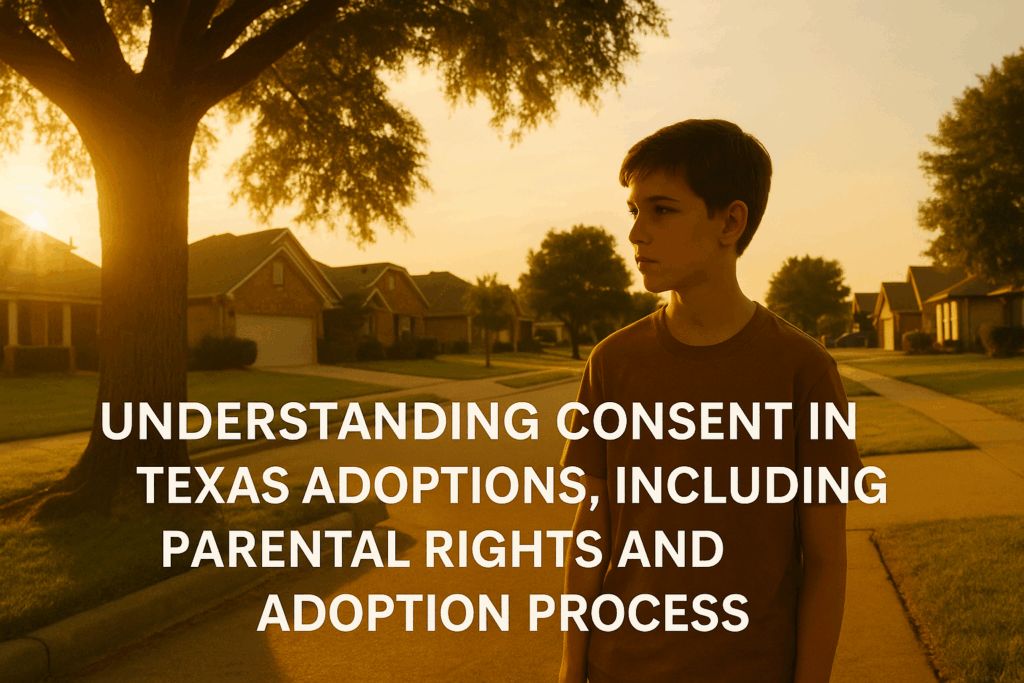
Have you ever wondered what happens when a child must decide if they want to be adopted during the emotional rollercoaster of a Texas divorce? When a child must consent to a Texas adoption, it’s more than just a legal checkbox — it’s a decision that can shape their sense of family, emotional stability, and even their performance in school. Here at The Law Office of Bryan Fagan, PLLC, we know firsthand how adoption and divorce intersect to create challenges for children that few parents expect.
So what’s the short answer? In Texas, kids aged 12 and older must provide written consent to an adoption, and that decision can feel like the weight of the world on their young shoulders. Add a divorce into the mix, and you’ve got the potential for disrupted routines, school changes, and academic struggles that no parent wants to see.
But don’t worry — we’re here to help. In this article, we’ll break down the legal requirements, share real stories from families like yours, and offer actionable tips to keep your child’s education on track. We’ll cover how Texas courts handle these delicate situations, what parenting plans can do to support your child’s school life, and why working with a compassionate attorney makes all the difference. Let’s dive in and make sure your child’s voice is heard — and their future protected.
Key Takeaways
- In Texas, children aged 12 and older must provide notarized written consent for adoption, while younger children’s feelings are still considered.
- The court can waive the consent requirement if it serves the child’s best interests, such as in cases of parental abandonment or the child’s inability to provide informed consent.
- Engaging children in the adoption process through open communication and counseling helps ensure their emotional readiness and supports smoother transitions into new family dynamics.

Your Adoption Journey Starts Here
Don’t navigate the adoption process alone. Schedule a consultation today and receive the expert guidance and support you need to build the family of your dreams.
Understanding Consent in Texas Adoptions
In Texas, the adoption process is carefully crafted to uphold the rights and emotional well-being of everyone involved, especially the child. As our attorneys frequently advise, a key aspect of this process is understanding when a child must consent to a Texas adoption. Under Texas Family Code § 162.010, children aged 12 and older are required to provide written, notarized consent, ensuring their voice is both respected and legally recognized in the adoption process. This consent requirement reflects the child’s emotional readiness and supports their sense of inclusion during a significant family transition.
In agency adoptions, written consent from children aged 12 and older plays a crucial role in demonstrating the child’s agreement with the adoption. For children under 12, while the law does not mandate consent, their feelings and readiness remain important considerations that licensed child placing agencies must evaluate. When a legal guardian is part of the equation, and the child’s biological parents’ rights have not been terminated, their consent must also be obtained to maintain compliance with Texas law and ensure the adoption aligns with the child’s best interests.
For additional insights, our legal professionals have helped many clients navigate these complex requirements, ensuring a smooth and ethical adoption process that prioritizes the child’s well-being. To explore related legal considerations, we invite you to read our in-depth adoption legal requirements guide for further guidance and insights tailored to your family’s unique situation.

Age Requirements for Child Consent
According to our family law team, when a child must consent to a Texas adoption is a fundamental part of the process that every adoptive family should understand. Under Texas Family Code § 162.010, children aged 12 or older must provide written, notarized consent to an adoption, ensuring that their voice is not only heard but respected. This requirement, which aligns with the latest updates to the Texas Family Code, helps guarantee that children are emotionally ready and aware of the changes adoption brings to their lives.
In cases such as stepparent adoptions, the court may waive the child’s consent requirement if it is in the child’s best interest, providing flexibility for unique family circumstances. However, the child’s psychological readiness and wishes remain critical factors that the court considers when deciding whether to uphold or waive this requirement. Our legal professionals have helped many clients understand how these nuanced decisions are made, ensuring that every step prioritizes the child’s well-being and future family dynamics.
Understanding the specific legal standards governing written consent forms is also vital. Consent forms must clearly state the child’s name, age, the names of the adoptive parents, and include a statement that the child understands the legal implications and agrees to relinquish their legal relationship with their biological parents. This ensures that the process is transparent and that the child’s consent is both informed and voluntary, as outlined in Texas Family Code § 162.010.
For more insight into challenging situations like stepparent adoptions where the other parent may not provide consent, we encourage you to read our comprehensive guide on Stepchild Adoption in Texas: What If the Other Parent Won’t Consent?. To learn more about adoption requirements and how our experienced team can help your family, explore our adoption resources.
Legal Standards for Written Consent
As our attorneys frequently advise, when a child must consent to a Texas adoption is a pivotal consideration under Texas Family Code § 162.010, which mandates that children aged 12 and older must provide voluntary, notarized, written consent for an adoption to be finalized. This requirement ensures that the child’s voice is respected and that their decision is both informed and free from coercion, aligning with the latest updates to the Texas Family Code.
Counseling or evaluations are often recommended to help assess the child’s emotional readiness and willingness to provide valid consent. These assessments ensure that the child fully understands the adoption’s legal implications and is not pressured into the decision. Consent forms must include the child’s name, age, the names of the adoptive parents, and a clear statement confirming the child’s understanding of the legal consequences and their agreement to terminate the legal relationship with their biological parents.
Court approval is essential to uphold the child’s rights, sometimes requiring additional evidence or testimony to confirm the consent’s validity. This step ensures that every aspect of the adoption process remains ethical, transparent, and legally compliant. For a deeper dive into this topic, our legal professionals recommend reviewing Understanding and Filing Texas Consent to Adoption Forms for additional insights and best practices.
Our team at The Law Office of Bryan Fagan, PLLC has helped countless families navigate these complex requirements, ensuring that every step supports the child’s emotional health and legal protections. To learn more about the adoption process and how our firm can assist you, please visit our comprehensive adoption resource page.
Exceptions to the Consent Requirement
While child consent is crucial in Texas adoptions, the court can waive this requirement if it determines it is in the child’s best interest.
The court might waive consent requirement if the child’s emotional or psychological well-being could be harmed, such as when the child is incapable of providing informed consent due to age or mental capacity in juvenile court.
If biological parents’ rights are terminated due to abandonment or lack of involvement, the court can waive their consent, ensuring the termination of parental rights adoption proceeds without unnecessary delays.
Texas judges can waive parental consent if it serves the child’s best interests, often based on evidence of the parent’s inability to fulfill their duties or the child’s expressed wishes.
The court may also waive the requirement for the child to attend the adoption hearing if it’s in the child’s best interest, showing the court’s flexibility in prioritizing the child’s welfare over procedural requirements.
We will now provide tips to help prepare your child for adoption consent, ensuring they are emotionally ready for this significant step.
Preparing Your Child for Adoption Consent
Preparing your child for adoption consent requires a thoughtful, transparent, and supportive approach that respects both their emotional readiness and legal rights. According to our family law team, it’s crucial to understand when a child must consent to a Texas adoption under Texas Family Code § 162.010, which requires children aged 12 and older to provide written, notarized consent. This ensures the child’s voice is heard and their participation is both legally valid and meaningful.
Start by having open, honest conversations about what adoption means for them and how it could impact their lives. This transparency builds trust and lays the foundation for a smooth transition. Reinforce that their opinions and feelings matter deeply in the adoption journey.
Counseling sessions offer a safe and supportive environment for children to express emotions, ask questions, and develop a mature understanding of the adoption process. As we’ve seen in our work with Texas families, involving the child early on helps ease the adjustment to new family dynamics and strengthens the parent-child relationship.
For additional guidance on consent requirements and adoption-related matters, we invite you to explore our adoption resources. Our legal professionals have helped many clients navigate these complexities, ensuring a smooth process that respects both the child’s rights and the family’s needs.

Judicial Discretion and Evidence for Waivers
Judicial discretion significantly impacts the adoption process, especially in waiving the consent requirement. Texas judges can waive the need for a child’s consent in specific circumstances, focusing on the child’s best interests.
Courts may require assessments of the child’s emotional and psychological readiness to support a waiver, ensuring their well-being is prioritized. These evaluations help judges make informed decisions about upholding or waiving the consent requirement.
Supporting evidence for a waiver can include:
- Documentation of a parent’s inability to fulfill their duties
- The child’s expressed wishes
- Consideration of factors like parental abandonment or lack of involvement.
If the child is incapable of providing informed consent due to age or mental capacity, the court may waive the requirement, ensuring the adoption proceeds smoothly without compromising the child’s welfare.
We will now provide real-world examples from our practice to illustrate how these principles can make all the difference in adoption cases.
Real-World Examples from Our Practice
As we’ve seen in our work with Texas families, when a child must consent to a Texas adoption is often the turning point that shapes their adoption journey. Under Texas Family Code § 162.010, children aged 12 and older must provide written, notarized consent to an adoption, ensuring their voices are respected and that they fully understand the significance of this decision. The latest updates to the Texas Family Code reinforce the importance of this consent, emphasizing that it must be voluntary and informed.
Our legal professionals have helped many clients understand how counseling and open communication can support a child’s readiness to consent. For instance, we recently worked with a 13-year-old boy whose consent paved the way for a nurturing home and smooth transition, significantly impacting his happiness and sense of belonging. In another case, a 12-year-old girl was initially hesitant but, through counseling and transparent discussions, felt empowered to make her own choice, resulting in a successful adoption and stronger family bonds.
These experiences highlight the vital role of counseling and supportive dialogue in preparing children for this step. According to our family law team, positive engagement helps children navigate their feelings, understand the legal process, and provide informed consent that reflects their true wishes.
For a deeper understanding of Texas adoption law, including consent requirements and how they align with the latest legal standards, we encourage you to explore Texas Adoption and the Family Code: Essential Guide for Parents. Additionally, visit our comprehensive adoption resources to see how our team can help guide your family through every step of the adoption journey.
The Role of an Experienced Attorney
Navigating the adoption process requires the guidance of an experienced attorney who understands the intricate legal landscape of Texas adoption. According to our family law team, knowing when a child must consent to a Texas adoption is critical. Under Texas Family Code § 162.010, children aged 12 and older must provide written, notarized consent to the adoption, a requirement that underscores the importance of respecting their voice and ensuring they are ready for this life-changing decision. To learn more about the key requirements, we recommend reading Who Must Provide Consent to Texas Adoption: Understanding Legal Essentials.
Our legal professionals have helped many clients understand the nuances of adoption law, including when consent may need to be waived in the child’s best interests. We navigate complex cases involving parental rights termination and consent waivers, ensuring that every step prioritizes the child’s well-being and aligns with the latest updates to the Texas Family Code.
An experienced adoption attorney also helps families plan for the financial aspects of adoption, including potential tax benefits and available assistance programs that can make the journey smoother and more affordable. This comprehensive support is essential to ensuring your family is prepared for the process ahead.
For more information on Texas adoption requirements and how our team can help protect your family’s future, we invite you to explore our adoption resources. Our commitment to educating families and protecting futures is at the heart of every case we handle, and we’re here to help you every step of the way.

Conclusion:
Navigating adoption and divorce in Texas can feel overwhelming, but remember — you’re not alone. The decision of when a child must consent to a Texas adoption is a profound one, and it’s essential to ensure your child feels secure, supported, and heard during this journey. At The Law Office of Bryan Fagan, PLLC, we’re here to guide you through every legal twist and turn, with a deep understanding of how divorce can impact your child’s academic performance and overall well-being.
As you move forward, take a moment to reflect on how your child’s education and emotional health intertwine. Have you spoken with your child’s teachers or school counselors lately? Sometimes the smallest conversations can lead to the biggest changes. And remember — having an experienced family law attorney by your side isn’t just about paperwork. It’s about building a stronger, more confident future for your family.
If you’re ready to talk about your situation, or if you just need some friendly, professional guidance, reach out to our team today. Let’s work together to protect your child’s future and give them the stability they deserve.
Adoption FAQ – Texas
In Texas, a child aged 12 or older must provide written or in-court consent to be adopted. However, the court may waive this requirement if it determines that the adoption is in the child’s best interest.
To adopt in Texas, prospective parents must be at least 21 years old, financially stable, and complete a home study. Additionally, the parental rights of both biological parents must be terminated before an adoption can proceed.
Yes, under certain circumstances. If the father has not legally established paternity, failed to support the child, or cannot be located despite diligent efforts, the court may terminate his parental rights, allowing the adoption to proceed without his consent.
Experts recommend discussing adoption with your child from an early age, ideally starting at birth. This approach helps normalize the concept and fosters open communication as the child grows.
In Texas, children aged 12 or older must consent to their adoption. For younger children, the court considers their best interests and may take their wishes into account, depending on their maturity and understanding.
The 3-3-3 rule is a guideline for adopting rescue dogs, outlining the adjustment periods: 3 days to decompress, 3 weeks to learn routines, and 3 months to feel at home. It’s not applicable to human adoption.
In Texas, a child aged 12 or older must provide written or in-court consent for a stepparent adoption. The court may waive this requirement if it deems the adoption to be in the child’s best interest.
Generally, no. Once an adoption is finalized, the biological parent’s rights are permanently terminated. Reinstatement is extremely rare and typically only considered in cases involving fraud or legal irregularities.
Bryan Fagan is a Texas family law attorney with a heart for adoption—inspired not just by his legal career, but by his own family story. Growing up in Atascocita with two adopted brothers, Bryan learned early the profound meaning of chosen family. His passion for justice was sparked by John Grisham’s The Pelican Brief, and he became the first lawyer in his family, balancing night classes at South Texas College of Law while caring for his grandmother with Alzheimer’s.
Today, Bryan brings that same dedication to his practice, guiding families through adoptions, custody disputes, divorces, and complex marital agreements. A certified member of the College of the State Bar of Texas, he combines elite legal expertise with genuine empathy—drawing from his roles as a husband, father of three, and advocate for families facing false CPS allegations.
Based in Houston, Bryan is actively involved in the Houston Bar Association’s Family Law Sector and statewide family law organizations. Whether finalizing an adoption or protecting parental rights, he believes the law should reflect the deepest values of home, commitment, and love.

